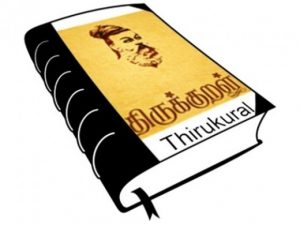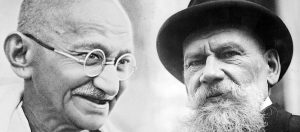The eternal Thirukkural
 Thirukkural – the brilliant Tamil literary work can be called the treasure house of worldly knowledge. It goes beyond any religion or creed. The name Thirukkural is made of two words; “Thiru” means “holy” and “Kural” means “short verse.” This great work is the creation of Thiruvalluvar who was a Tamil poet and author. Through his work he analyzed the intricacies of human nature with pragmatic insights. Thiruvalluvar’s masterpiece is almost 2000 years old. All the Kurals (verses) have only 7 words and thus all the 1330 ThiruKurals fit within 140 characters. Who was Thiruvalluvar? Very little is known about him. It is said that he was a simple weaver who wrote the kurals with divine inspiration; how could a simple weaver write something so profound almost 2000 years ago? In those days education was reserved for the richer and nobler classes. While reading this book of short verses, you just cannot say that it is written by a layman. The verses touch upon core values for the human race. In true sense it is a road map for the essential, fundamental and everlasting aspects of human life.
Thirukkural – the brilliant Tamil literary work can be called the treasure house of worldly knowledge. It goes beyond any religion or creed. The name Thirukkural is made of two words; “Thiru” means “holy” and “Kural” means “short verse.” This great work is the creation of Thiruvalluvar who was a Tamil poet and author. Through his work he analyzed the intricacies of human nature with pragmatic insights. Thiruvalluvar’s masterpiece is almost 2000 years old. All the Kurals (verses) have only 7 words and thus all the 1330 ThiruKurals fit within 140 characters. Who was Thiruvalluvar? Very little is known about him. It is said that he was a simple weaver who wrote the kurals with divine inspiration; how could a simple weaver write something so profound almost 2000 years ago? In those days education was reserved for the richer and nobler classes. While reading this book of short verses, you just cannot say that it is written by a layman. The verses touch upon core values for the human race. In true sense it is a road map for the essential, fundamental and everlasting aspects of human life.
The Thirukkural is arranged in 133 Adhikarams (chapters of themes) each with 10 couplets. The 133 Adhikarams are divided into three major groups known as “Aram”, “Porul” and “Inbam”. Aram represents Virtue; Porul describes the principles of life for common people as well as the State. The last section “Inbam” deals with features and quintessence of Love. The overall organization of Thirukkural is as follows, based on seven ideals prescribed for people followed by observations on Love.
- 40 couplets on God, Rain, Virtue and Ascetics.
- 200 couplets on Domestic Virtue.
- 140 couplets on Higher Virtue based on Grace.
- 250 couplets on Royalty.
- 100couplets on Ministers of State.
- 220 couplets on the Essential requirements of Administration. In fact these are very good lessons on management.
- 130 couples on Morality, both positive and negative.
- 250 couplets on human love, sex and fervor.
Thirukkural has been translated in as many as 35 global languages, including 27 foreign languages such as English, French, German, Japanese, Latin, Malay, Portuguese and Spanish and Chinese was the latest one. So far, 96 scholars have translated Thirukkural in English and the first was done by Rev. G.U. Pope. The book has also been translated into ‘Vaagriboli,’ the language of Narikuravas – the tribal community in Chennai.
Thirukkural talks about the three main facets of life; wisdom, wealth and love and the Tamil literature talks of a fourth aspect “veedu,” which refers to God, or nirvana. I think if one follows every “kural” (maxim), he/she will automatically reach nirvana “veedu.”
Take any topic in management; from planning, coordination, leading, communication, managing people, and selection of people, training, and development, personality; take anything and you find them in well written verses and well explained in Thirukkural. The poet Thiruvalluvar must have written them for kings and their ministers then. But, in today’s complex and fast forward world also they still give clear directions.
 Thiruvalluvar has written brilliant verses on leadership; he mentions leadership as more of an attitude and a way of living and behaving. Leaders must inspire those around them by action and setting examples. It is about standing up for others and shielding them from harm. Leaders must be graceful. Today, when we imbibe West in all manners, we forget that our own literary classics have enormously rich material. It’s pitiable fact that we can’t draw relevance from them and relate them to needs and problems of the present. It seems Mahatma Gandhi learnt the concept of non-violence from a letter written to him by famous Russian novelist Leo Tolstoy who quoted couplets on non-violence from German translation of Thirukkural. The Father of the Nation had said that he came to know about Thirukkural first from Tolstoy!
Thiruvalluvar has written brilliant verses on leadership; he mentions leadership as more of an attitude and a way of living and behaving. Leaders must inspire those around them by action and setting examples. It is about standing up for others and shielding them from harm. Leaders must be graceful. Today, when we imbibe West in all manners, we forget that our own literary classics have enormously rich material. It’s pitiable fact that we can’t draw relevance from them and relate them to needs and problems of the present. It seems Mahatma Gandhi learnt the concept of non-violence from a letter written to him by famous Russian novelist Leo Tolstoy who quoted couplets on non-violence from German translation of Thirukkural. The Father of the Nation had said that he came to know about Thirukkural first from Tolstoy!
Later, Mahatma Gandhi was inspired strongly by Thirukkural; he then inspired all sections of the society to fight for freedom from the foreign oppression through his deliberately chosen path of truth and non-violence. He provided inspiration to many oppressed nations in the world to fight against colonization and become free. He continues to inspire the world even today. Thus Thirukkural can be hailed as an eternal light which lightens up the world for over two thousand years. Mahatma Gandhi got the spark from Thirukkural, Martin Luther King, Martin Luther King jr., Nelson Mandela and many more leaders who fought against oppression and dictatorship adhering to a non-violent way followed Mahatma Gandhi. In fact Gndhiji used preach many couplets from Thirukkural in his speech. Truth and Non-violence can never be underestimated. These two paramount practices can only control terrorism and religious fundamentalism which are the main cause of unrest in many parts of the world. It’s a pity that mass-murder and sabotage are destroying mankind and destabilizing many nations.
 In the subjects of Political Science, Management and Public administration, Thiruvalluvar seems supreme in his presentation and humanistic approach than many of his contemporaries. Recently, on 16th Jan 2015, Prime Minister Narendra Modi released a Gujarati translation of Thirukkural. I conclude my article with one of my favorite couplet “Just as the hand rushes involuntarily to protect one’s honor in case of accidental state of undress, so does a friend come to his friend’s aid without being asked”
In the subjects of Political Science, Management and Public administration, Thiruvalluvar seems supreme in his presentation and humanistic approach than many of his contemporaries. Recently, on 16th Jan 2015, Prime Minister Narendra Modi released a Gujarati translation of Thirukkural. I conclude my article with one of my favorite couplet “Just as the hand rushes involuntarily to protect one’s honor in case of accidental state of undress, so does a friend come to his friend’s aid without being asked”












































